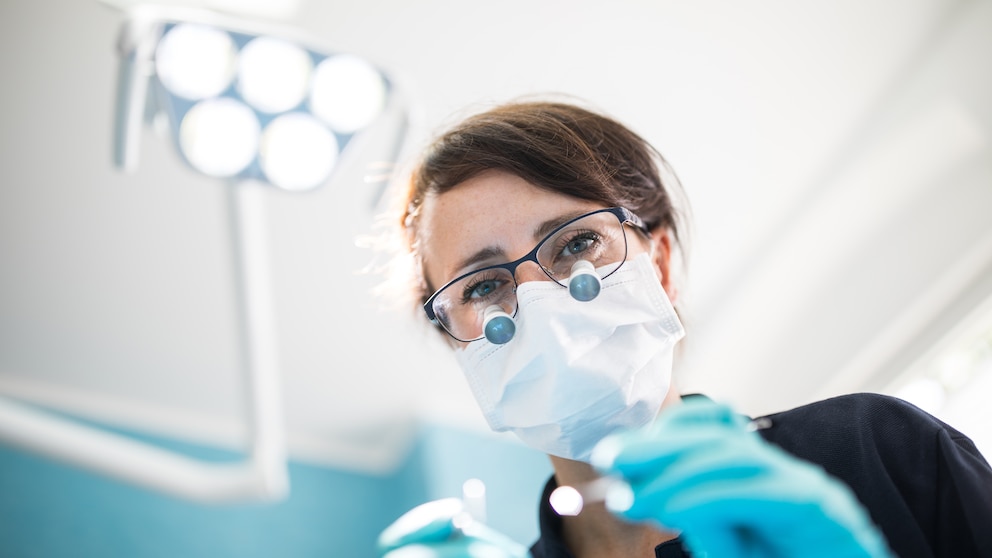October 24, 2024, 12:45 pm | Read time: 4 minutes
Dentists are primarily responsible for the health of our teeth, gums, and jaws. But with their expertise, they can also diagnose other diseases and ailments. Especially those that bother us while we sleep, as a recent study shows.
Dentists often have the unfortunate reputation of not being real doctors and caring more about the aesthetics of teeth than the health of their patients. But many people don’t realize this: Inflammation in the mouth can also promote other diseases. For example, periodontitis bacteria can increase the risk of heart disease and Alzheimer’s. A study now shows that dentists can also detect signs of dangerous sleep disorders such as sleep apnoea. This is particularly remarkable, as the insidious sleep disorder often goes undetected. And this can have long-term detrimental effects on one’s health.
Overview
Why is sleep apnea dangerous?
According to the Lung Information Service of the Helmholtz Zentrum München, around 30 percent of men and 13 percent of women in Germany suffer from obstructive sleep apnea.1 The incidence increases significantly with age. In children, however, the figure is around four percent. The most common form is obstructive sleep apnea. In this case, the upper airways temporarily close during sleep, which leads to breathing stops.
If left untreated, sleep apnea can have serious consequences, as we have already explained in a detailed FITBOOK article on this topic. The condition can reduce life expectancy by around ten years on average.2 This is because the brain is temporarily undersupplied with oxygen due to breathing interruptions. This can lead to circulatory issues within the heart muscle. Around half of those affected also develop cardiomyopathy, cardiac arrhythmia, and high blood pressure during the course of the disease. Those affected also have an increased risk of the following serious illnesses:
- Stroke
- Heart attack
- Diabetes
How a dentist can diagnose sleep disorders
A new study published in “Sleep Epidemiology” now shows that dentists can detect dangerous sleep disorders such as sleep apnea, which otherwise often go unnoticed.3
For this meta-study, the researchers analyzed studies on sleep from 1990 onwards that were related to dentistry. The focus was particularly on findings from the field of sleep neuroscience and sleep disorders. The aim of the meta-study is to provide dentists with sound knowledge about sleep and its role in patient health.
According to the study, dentists are usually among the first to screen people for possible sleep disorders such as sleep apnea and refer them to a sleep specialist. The researchers even say dentists play an important role in rescuing people with dangerous sleep problems. “Dentists can be the first line of defense in recognizing sleep disorders. They often recognize the symptoms long before other doctors do. Signs such as teeth grinding, tongue slipping, or even a patient falling asleep in the dental chair can be early indicators of underlying issues,” explains one of the study authors, Davis Thomas from the American Rutgers School of Dental Medicine, in a university press release.4

When a hangover is excluded Headaches in the morning? The possible causes at a glance

According to the study What your sleeping position reveals about your risk of Alzheimer’s disease

FITBOOK Experts Dr. Anne Heinz: “I advise against tooth whitening for under-18s”
Dentists should look out for these symptoms
As the researchers found out, there are clear signs of sleep apnoea that a dentist can recognize. The following signs should, therefore, be taken seriously:
- enlarged jaw muscles
- hollowed-out edges of the tongue
- white lines on the cheeks
- reduced visibility of the throat
- tooth wear from teeth grinding
Taking these factors and the patient’s medical history into account, dentists are able to identify up to 80 percent of patients at risk, say the researchers. An important sign in this context is, of course, sleepiness and frequent fatigue, which indicates a sleep disorder.
“It’s no longer just about looking at the teeth,” says researcher Davis Thomas. Dentists should look at the whole patient, from their behavior in the waiting room to the subtle signs in the oral cavity. In this way, the dentist can also make an important contribution to the diagnosis of sleep disorders such as sleep apnea. Here, for example, sleep-related questions in the usual medical history questionnaires can also provide information. However, this also means that dentists need to be trained to recognize and correctly interpret any symptoms of sleep disorders.

